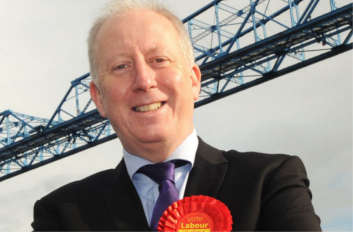Network Rail has been forced to scale back plans to electrify rail lines across the country, while the Government is set to establish new methods for delivering rail enhancements in the wake of financial and project delivery troubles.
Works on the Midlands Mainline, the Great Western Mainline and parts of the North have been halted.
In a written statement as Parliament on broke up for the summer on Thursday, the transport secretary justified leaving long-promised but expensive electrification works incomplete by claiming that using so-called bi-mode trains ‘offers seamless transfer from diesel power to electric that is undetectable to passengers’.
The Department for Transport said ‘modern bi-mode trains will be used on Great Western and Midland Main Line’, with ‘the train operator in the Lake District beginning work to trial an alternative-fuelled train’.

Andy McDonald MP, Labour’s shadow transport secretary
It added: ‘Thanks to this new technology disruptive electrification works between Cardiff and Swansea, Kettering, Nottingham and Sheffield, and between Windermere and Oxenholme, will no longer be needed.’
Andy McDonald MP, Labour’s shadow transport secretary, said: ‘The Tories have been promising the electrification of the Great Western Mainline from Paddington to Swansea since 2012 and today’s announcement confirms that they have been taking people for a ride.
‘The decision betrays a promise to South Wales and the transport secretary sneaking out the news on the final day before he goes on his summer holidays adds insult to injury.’
Mr Graying also published the Government’s high level output specification (HLOS) and initial statement of funds available (SOFA) for the railway for Control Period 6 (CP6), from 2019 to 2024.
However the Government did not provide any funding estimates. Mr Grayling said:'Before committing to the specific levels of funding required, I have decided that the Government requires more assurance on the likely costs of the work programme.'
He added: ‘Network Rail’s progress on improving its efficiency in recent years has fallen short of my expectations. The Government will therefore carry out further work to examine the approach to setting appropriate levels of maintenance and renewals activity for control period 6 and to improving Network Rail’s efficiency.'
Mr Grayling said this would enable him to confirm the funding envelope by publishing a definitive SOFA by 13 October 2017. He added that the Government is developing a new process for delivering enhancements and intends to publish more information on this in the Autumn.
The HLOS document states that its emphasis is on ‘the operations, maintenance and renewal of the existing railway’ and does not commit to infrastructure enhancements, which will be dealt with separately.
In a statement to MPs, Mr Graylng said that, based on advice from the Office of Rail and Road and the rail industry, ‘the government has agreed that an increased volume of renewals activity will be needed over the course of control period 6’.
Reaction
Gordon Wakeford, chair of the Rail Supply Group, said: ‘Going forward, we urge Government and Network Rail to pay careful attention to the issues that can be caused at the end of a Control Period and the start of another, but we welcome today’s first major step in the CP6 process and, as a supply chain, look forward to working with them on this basis.’
Paul Plummer, chief executive of the Rail Delivery Group, said: ‘The industry will welcome government’s continued commitment to five-year funding settlements for operations, maintenance and renewal.’
He added: 'It is right to allow extra time to ensure that decisions about how it is funded are got right.’
Ken Skates, the Welsh Government's cabinet secretary for economy and infrastructure, said: 'I am extremely disappointed with today’s announcements that not only provide no commitment from the UK Government to enhance our rail network in the 2019-2024 period, but also roll back on the commitment to electrify the line between Cardiff and Swansea.
'It is enormously disappointing that UK ministers chose to brief the press instead of Welsh ministers in advance of their decision to back-track on their promise to modernise the mainline in south Wales, and chose to try to bury this bad news at the very end of the parliamentary session.'
Register now for full access
Register just once to get unrestricted, real-time coverage of the issues and challenges facing UK transport and highways engineers.
Full website content includes the latest news, exclusive commentary from leading industry figures and detailed topical analysis of the highways, transportation, environment and place-shaping sectors.
Use the link below to register your details for full, free access.
Already a registered? Login